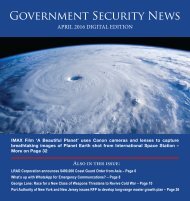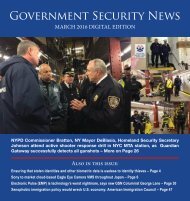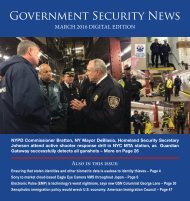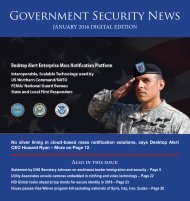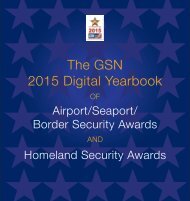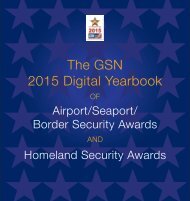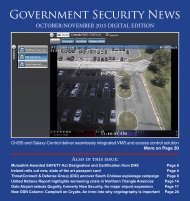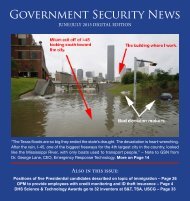GSN20150701.pdf
Create successful ePaper yourself
Turn your PDF publications into a flip-book with our unique Google optimized e-Paper software.
Studies in security are trending to mimic real life,with homeland security and emergency managementincreasingly intertwined, according to twoacademic leaders. At the same time, as the firstgeneration of post-9/11 security workers headstoward retirement, educational expectations arerising for the field.Currently, the Naval Postgraduate School,which coordinates the Center for Homeland Defenseand Security’s University and Agency PartnershipInitiative, lists 441 homeland securityprograms—112 certificates, 57 associate degrees,97 bachelor degrees, 29 master’s degrees and ninedoctoral degree programs (https://www.uapi.us/programs/category/programs).But just as government agencies are unitingareas of specialty, so too, is the academic world.The University of Maryland University College(UMUC) has proposed to the Maryland HigherEducation Commission that it combine two specializations—emergencymanagement and homelandsecurity—into one stand-alone program,says Dr. Irmak Renda-Tanali, professor and programchair of the Homeland Security& EmergencyManagement, and Information & TechnologySystems Department in the UMUC graduateschool.“These strategic missions overlap with the overallmission of emergency management; FEMA,the federal agency tasked with emergency managementand disaster response, is strategicallysituated within the Department of Homeland Security(DHS).“We see similar arrangements at the state andlocal level,” Renda-Tanali continues. “We see ‘theOffice of Homeland Security and EmergencyManagement’ in several counties and cities withinthe state of Maryland.”Overlapping duties and striving for effective, efficientuse of resources may make the single umbrellaa practicality. “Combining the two areas ofspecialization would give a greater control overthe core learning areas that are shared across bothfields, a greater control of program integrity, a betteralignment of competencies across the industrycore job competencies, and future accreditation ofthe program,” says Renda-Tanali,who serves as executive editor ofthe academic “Journal of HomelandSecurity and Emergency Management,”which also bridges bothfields.“Homeland security, nationalsecurity or intelligence, and emergencymanagement are not synonymousbut they are all not mutuallyexclusive,” says Dr. Jibey Asthappan,director of the national securityprogram at the University of NewHaven. The University of New Haven pioneered agraduate program in national security in 2001 andnow offers the Master of Science at New Haven aswell as at the Kirtland Air Force Base in Albuquerque,New Mexico. The program added an undergraduatedegree in 2013—so is about to graduateits first class among the 140 students enrolled inthe undergraduate program.Homeland security studies have a wide varietyof classes, with skills spanning anti-terrorism activities,politics, psychology, crime analysis, explosives,software development and computersecurity, as well as the more physical aspects ofintelligence.Certificates (four to six classes, 12 to 18 credits)Education/TrainingDegrees getting more important as universitiesmerge homeland security disciplinesWhen this is the standard and foundation of allsecurity operations, leaders flourish. Whether anindividual’s responsibilities are to oversee an entireorganization, conduct security patrols at a hospitalor produce accurate payroll and billing, the needfor leadership is the always present. Leaders takepride in their work, strive to exceed expectationsand support those around them. Those attributesare necessary in every aspect of a security operationand learning provides the knowledge andconfidence to succeed.Engagement in this type of culture promotesconstant development, results in service excellenceand encourages employees who may start standingpost at an entry level position to work their wayup through the company with the support of theorganization.About the Author:Brent O’Bryan is Vice President, Learning & Developmentfor AlliedBarton Security Services, www.alliedbarton.com,a premier provider of highly trainedsecurity personnel.Dr. Jibey Asthappanare perfect for developing specific skills, Asthappansays. Degree programs provide a wider rangeof topics, from terrorism to legal framework, managerialskills, foreign languages and more. Degreedemployees will be more in demand in the future,both Renda-Tanali and Asthappan agree.“In emergency management, national andhomeland security (after 9/11), most jobs wereheld by individuals with no degrees in the areaof study,” Asthappan says. Instead,people who held related jobs wereessentially pushed into the careerfield from law enforcement and themilitary; Asthappan himself was anexplosive ordnance disposal (EOD)technician.“There’s been a massive swing ineducation,” Asthappan says. “It’s away to keep up with the changes. …Over the next 10 years, you’ll needdegrees to take these jobs—which,by the way, will be a huge benefit tothe public.”While past careers leaned heavily on governmentjobs, the private sector is now seeing a hugeneed for security professionals, Asthappan says.For instance, a global pharmaceutical manufacturermight need to protect again drug shipmentsfrom being hijacked and to assure the safety of itsemployees. So companies like this might start theirown security departments.An ongoing trend is for private security contractorsto work with the government. For instance,Asthappan notes, the process of deploying 100,000military personnel would be more politically intricatethan deploying the same number of privatecontractors. So, at this point, Asthappan says,“DHS has 250,000 employees and 250,000 contractors;just as many people work for DHS as contractorsthat work with them.”With complexities increasing, he says, “There’sa push for professionalism in the field. Now youneed a degree in order to do this job adequately.”As the post-9/11 employees prepare to retire, thenew, college-educated generation of security employeesbrings groomed skills to the table.“It’s a wonderful time in the field,” Asthappansays, “not just for students, but for the public.”July/August, 2015 GSN: Government Security News www.gsnmagazine.com 25



